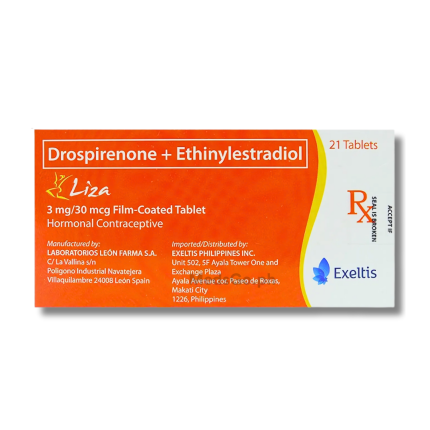Indications / Uses
LIZA Drospirenone / Ethinylestradiol 3mg / 30mcg is used for the prevention of pregnancy in women who elect to use an oral contraceptive method. Beyond its primary role in contraception, it is also indicated for the treatment of moderate acne vulgaris in women at least 14 years of age who have no known contraindications to oral contraceptive therapy. Additionally, this formulation helps in managing symptoms of premenstrual dysphoric disorder (PMDD) such as physical and emotional distress.
Formulation / Ingredients
LIZA Drospirenone / Ethinylestradiol 3mg / 30mcg contains: Drospirenone 3mg + Ethinylestradiol 30mcg
Do I need prescription to buy LIZA Drospirenone / Ethinylestradiol 3mg / 30mcg?
Yes, you need a prescription. But if you don't have one, you can get a free teleconsultation from MedsGo Physician. Just make an order and our Physician will call you back.
Side Effects
LIZA Drospirenone / Ethinylestradiol 3mg / 30mcg common side effects include: headache, nausea, breast tenderness, and menstrual irregularities such as spotting or breakthrough bleeding. Some users may also experience mood swings, abdominal pain, or weight fluctuations. While rare, more serious risks include blood clots and increased blood pressure in susceptible individuals.
Directions and Dosage
- Adults (18+ years): 1 tablet daily for 21 consecutive days. Followed by a 7-day tablet-free interval. Do not exceed 1 tablet in 24 hours.
- Adolescents (14–17 years): 1 tablet daily for 21 consecutive days. Followed by a 7-day tablet-free interval. Do not exceed 1 tablet in 24 hours.
Not recommended for use before the start of menstruation. Tablets must be taken at approximately the same time every day to maintain efficacy. Maximum treatment duration is ongoing as long as contraception is desired.
Contraindications
Prohibited for use in individuals with a history of deep vein thrombosis, pulmonary embolism, or active blood clotting disorders. It should not be used by those with severe liver disease, kidney insufficiency, adrenal insufficiency, or hormone-dependent cancers. Avoid use if experiencing undiagnosed vaginal bleeding or frequent migraines with aura.
Special Precautions
- Increases the risk of serious cardiovascular events, especially in women over 35 who smoke.
- May cause an increase in serum potassium levels; caution is advised for those with conditions predisposing to hyperkalemia.
- Regular monitoring of blood pressure and glucose levels is recommended during long-term use.
Is it safe to take it with other medications?
Certain antibiotics, anticonvulsants, and herbal supplements like St. John's Wort can reduce the effectiveness of the hormones. Use with potassium-sparing agents may increase the risk of elevated potassium levels.
How should I store it?
Store in a cool, dry place at a temperature not exceeding 30°C. Keep the tablets in their original blister pack to protect from light and moisture.
Used For
- Oral Contraception
Age
- From 14 years
Features
- Drospirenone
- Ethinylestradiol
Reviews
No reviews found
Pharmacist answers to questions about LIZA Drospirenone / Ethinylestradiol 3mg / 30mcg - 1 Box x 21 Tabs


